AND TRUTH
An Erskine Theological Seminary publication
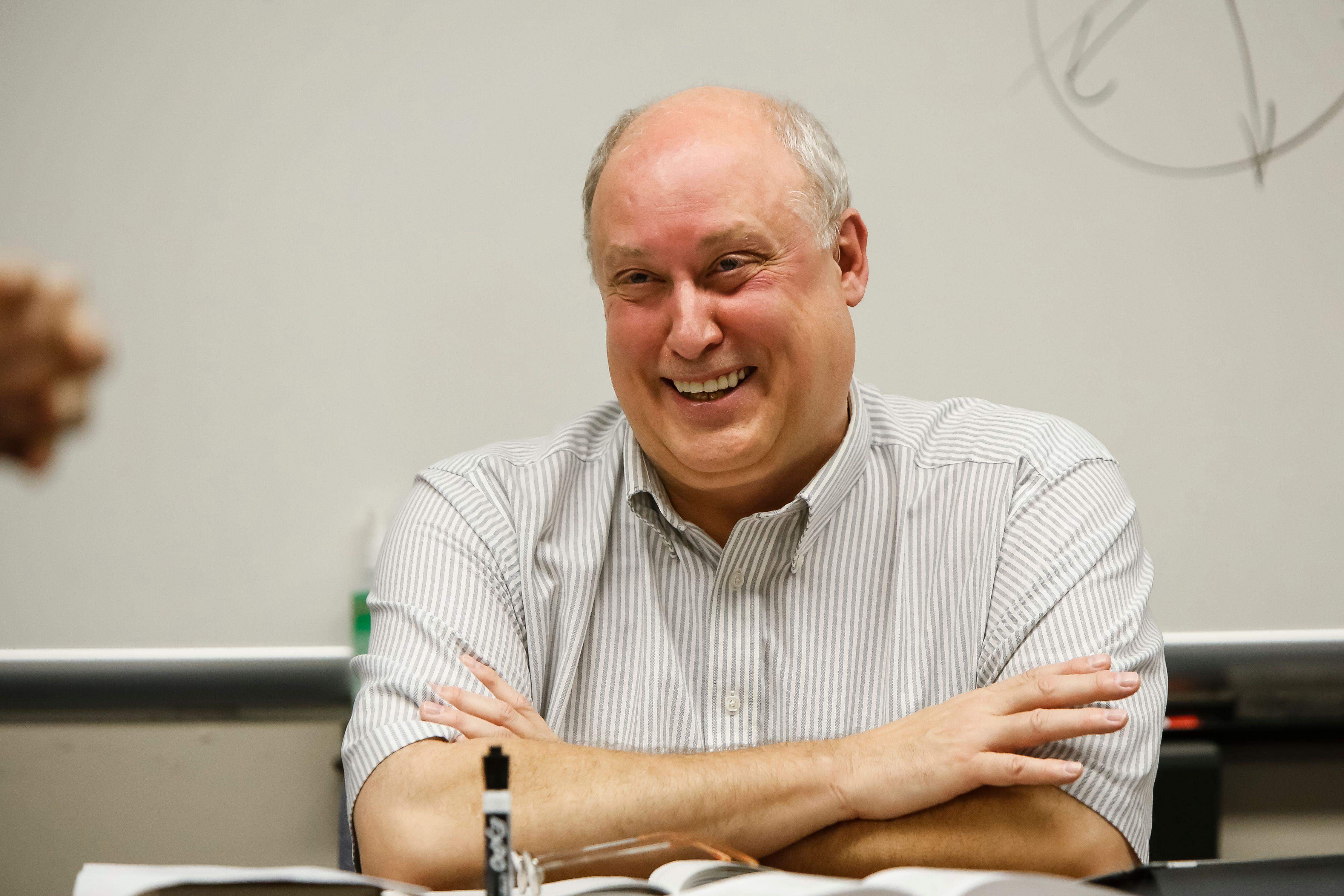
The Bible is the basis of all we are and do at Erskine
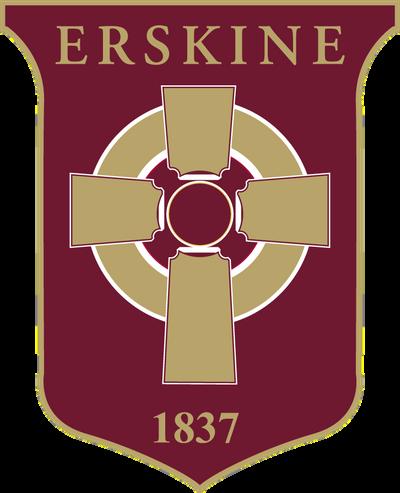
CONTENTS
In Memoriam - Dr. Terry L. Eves
From the Provost Travel and Learn
Let's Study Luther!
Study the Historical Geography of Israel
Faculty Spotlight
Guarding the Truth, Dr. RJ Gore, Dean
The Inerrancy of Scripture, Dr. Mark Ross
Student Spotlight
Lamp to My Feet, Light to My Path, Emily Woodard
Alumni Spotlight
How Will They Hear Without a Preacher? Chaplain (Major) Britton Price
News at Erskine
New Degree Faculty Institutes Alumni
4
6
9
13
15
17
CONTRIBUTORS:
Dr. R.J. Gore
Heath Milford
Dr. Michael A. Milton
Chaplain (Major) Britton Price
Dr. Mark E. Ross
Emily Woodard
EDITORIAL TEAM:
Dr. Michael A. Milton, Executive Editor Heath Milford, Editor Langley Shealy, Graphic Design/Layout
Photography, Shawn Knox, Robert Shields, Heath Milford, Robin Broome
FROM THE PROVOST
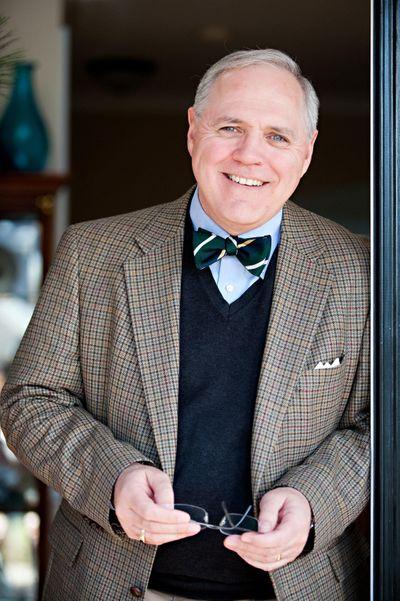
In Memoriam - Dr. Terry L. Eves
My beloved Students, Alumni, Colleages, fellow Faculty, Board members, and Friends in Christ:
May the peace of our Lord Jesus Christ be with you.
You have undoubtedly heard the news that our dear teacher, colleague, a Doctor of the Church, our Christian brother, and a loving father in the faith, Dr. Terry Eves, is, now, home with the Savior he taught so well and for so long. When I learned of my friend’ s passing, I sat and prayed without words. One verse of Holy Scripture so occupied my mind that it was as if all other functions of thought were suspended. And with all other thoughts receded, one quiet voice echoed throughout my person. In that moment, I knew nothing but the witness of St. John:
“These things said he: and after that he saith unto them, Our friend Lazarus sleepeth; but I go, that I may awake him out of sleep” (John 11:11 KJV).
And this consoled me, instructed me, and has become my message to our humble community: Dr. Eves sleeps in Jesus. His body awaits the Resurrection, but the man, Terry Eves is more alive than he has ever been. For Christ has awakened him. The Lord Jesus awakened Terry Eves many decades ago when he was born again. He passed from death to life long before the processes of the Fall visited him. So, at his passing, dear Terry responded to the Lord’ s sure summons again. And our Dr. Eves the person we knew, whom we loved, and from whom we were taught the Holy Scriptures rose from the hospital bed and walked through that portal, the mysterious nexus where time and eternity touch, which once was death. Thus, the awakened man became fully alert. The transformed soul who was our professor of Christ’s Word became the transfigured spirit who is God’s prize in Christ’s worship. Thus, the Old Testament portion that Terry taught has become the New Covenant promise, to his wife and family, and, yes, to each of us:
“Precious in the sight of the LORD is the death of his saints“ (Psalm 115:16 KJV).
Our Dr. Eves's home-going was a quiet event. Many did not know of his recent surgery. He passed from us, in some sense, as he lived among us: a gentle and retiring man preferring the solitude of study, or time with a student, between classes: teaching the Gospel on a bench in the shade of a towering oak. The man was quiet so that his teaching roared without rival; reverberating God’ s glory and Christ Jesus’ salvation. Several of you have told me in a way, “His teaching of the Bible remains the fuel for ministry.”
So, it is good and right that we say, “This surely must be his legacy:”
“And you show that you are a letter from Christ delivered by us, written not with ink but with the Spirit of the living God, not on tablets of stone but on tablets of human hearts” (2 Corinthians 3:3 ESV).
Our seminary family no, the entire the Church militant feels the stinging pain of loss. Truly, I miss him as I memorialize him. I know that you feel this pain, too. Some, his family, feel that ache so much more than you and I can know. So, as Jesus wept, let us mourn: for Terry’s life, Terry’s presence, and Terry’s ministry, all vital facets of the man who touched so many so deeply. But let us, then, rise. For our gentle giant of Faith has left us with a living legacy of hope.
The Lord grant you eyes of faith to know His resurrected presence and His undying love, now, and in every season of our lives.

MICHAEL A. MILTON, PhD, MDiv, MPA Provost, Erskine Theological Seminary
James H. Ragsdale Chair of Missions and Evangelism
OUR MISSION OUR COMMITMENTS
Erskine Theological Seminary supports the Mission of God in the world by educating, from a biblically Reformed perspective, persons for service in the Christian Church (Matthew 28:16-20).

Erskine Theological Seminary Seeks to Glorify God.
Erskine Theological Seminary Is Biblical.
Erskine Theological Seminary Is Evangelical.
Erskine Theological Seminary Is Reformed.
Erskine Theological Seminary Serves the Whole Church.
Erskine Theological Seminary Prepares Students for Ministry.
OUR BELIEFS
We Believe
The Bible alone, being God-breathed, is the Word of God Written, infallible in all that it teaches, and inerrant in the original manuscripts.
That there is one God, eternally existent in three persons: Father, Son, and Holy Spirit.
In the deity of the Lord Jesus Christ, in his virgin birth, in his sinless life, in his miracles, in his vicarious and atoning death through the shed blood, in his bodily resurrection, in his ascension to the right hand of the Father, and in his personal return in power and glory.
That for the salvation of lost and sinful man, regeneration by the Holy Spirit is absolutely essential.
In the present ministry of the Holy Spirit by whose indwelling the Christian is enabled to live a godly life.
In the resurrection of both the saved and the lost; they that are saved unto the resurrection of life and they that are lost unto the resurrection of damnation.
In the spiritual unity of believers in the Lord Jesus Christ.
TRAVEL AND LEARN
June 15-25 & 25-28, 2020
Study the Historical Geography of Israel
Walk in the footsteps of Abraham, David, Jesus, and generations of pilgrims as you encounter the valleys, mountains, seas, and sites of the Bible. Discover how the contours of the Biblical landscape bring new dimensions of understanding to your reading of the Bible. Learn how the story of the Lord’s redemption of His people unfolded in the fullness of time. Rejoice in the resurrection of Jesus Christ near the empty tomb. Gain perspective on the people and politics of three Abrahamic religions. Journey home with memories of Biblical scenes and a new awareness of the Bible’s witness to the history of salvation.
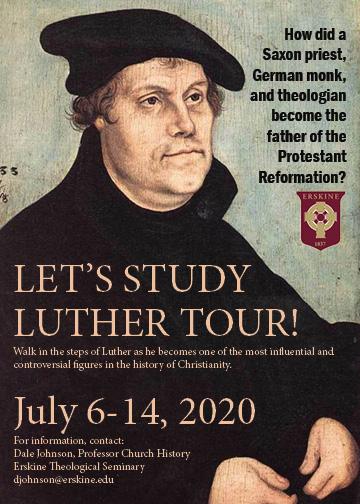

Click Here for More Information
July 6-14, 2020
Let's Study Luther Tour!
Walk in the steps of Martin Luther as he becomes one of the most influential and controversial figures in the history of Christianity!
When Martin Luther, on October 31, 1517, posted his Ninety-five Theses on the door of the Castle Church in Wittenberg, Germany, his action helped begin the Reformation, with its remarkable people, ideas and events that decisively affected Christianity and, ultimately, world history.
Click Here for More Information
How Firm a Foundation
FACULTY SPOTLIGHT

Guarding the Truth
R.J. Gore, D.Min., Ph.D., Professor of Systematic Theology and Ministry
Dr.R.J.Gore,DeanandProfessorofTheologyandMinistry,graciouslyagreedtositdown withusandreflectonhistimeatErskineSeminary.Wechosetofocusspecificallyonthe importanceofGod’ sWordattheseminary.
Describe Erskine Theological Seminary when you arrived in 1996?
Well, I was surprised by the breadth of viewpoints held by the faculty. The ARP Church had experienced controversy in the 1970s when faculty members at Erskine Seminary published two articles listing a number of alleged “ errors ” in Scripture. These articles launched a
denominational fight that continued for several years and was temporarily ended by a statement in 1979. However, that statement satisfied very few. The word “inerrancy” was deliberately omitted in order to gain widespread approval. When I arrived at Erskine in 1996, I found a faculty evenly divided on this issue. About half affirmed inerrancy and the other half did not.
How did things develop after that time?
Oddly enough, I was selected to become the new Vice President and Dean in 1998. That meant I had a strong say in who was hired as full-time faculty. As it turned out, my time of leadership coincided with the retirement of several faculty members. I made it a policy to hire faculty members who were able to join the Evangelical Theological Society which requires an affirmation of inerrancy as part of their membership requirements. Over several years the overall complexion of the seminary significantly changed and we became much more theologically conservative even as the Associate Reformed Presbyterian Church was also becoming more theologically conservative.
How do you view your role in this historical process?
I left Active Duty service as an Army officer to come to Erskine in 1996. Then in 2004 I literally went to war in Iraq. But this was not the sum and total of my warfare. I would suggest that beginning in 1996, and for the majority of the next two decades, I was continually at war - metaphorically speaking, that is. At first it seemed a lonely fight, but over time others: faculty members, students, ministers, and board members, came alongside to join the struggle to affirm the integrity of God’s Word as infallible and inerrant. Today Erskine Theological Seminary stands on this sure foundation because of their efforts.
What do you anticipate for the future?
I am confident that the ARP Church has made a clear movement towards historic orthodoxy with its 2008 synod votes on inerrancy. This synod also gave direction to all synod agencies, including Erskine Theological Seminary, to hire only those who affirm the inerrancy of Scripture. As we move into a new period of transition, hiring new faculty members to replace those of us reaching retirement age, I am committed to making sure we hire those who agree with our synod’s position on the inerrancy of Scripture. If you are not convinced of the truthfulness of God’s Word, then what is the basis of your belief, the basis of your teaching, the basis of your preaching? If it is not God’s Word, then whose Word? It is the God-breathed Word, alone, that is “profitable for teaching, for reproof, for correction, and for training in righteousness.” This is what we believe, and this is what we teach at Erskine Seminary.
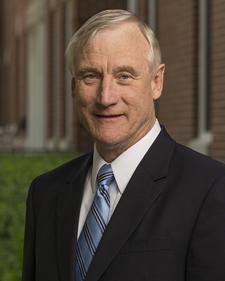
The Inerrancy of Scripture
Mark E. Ross, Ph.D., Professor of Systematic Theology
The doctrine of the inerrancy of the Holy Scriptures states that the sixty-six books of the Old and New Testaments are the Word of God written and thus are without error in all that they teach. Both the Old and New Testaments uniformly present the Scriptures as the very words of God, and this has been the historic teaching of the church since its earliest days. It is confessed by the Associate Reformed Presbyterian Church today, and as the seminary of that church Erskine Theological Seminary joins in that confession.
What the Bible Says about the Bible
The Scriptures originated with Moses (Exod. 17:14-16, 24:4, 34:27; Num. 33:2; Deut. 31:24) and are the written expression of the LORD’s covenant with his people. This “Book of the Law” was placed alongside the Ark of the Covenant within the Holy of Holies (Deut. 31:26). The Ark contained the two tablets of stone on which the Ten Commandments had been written with the finger of God (Ex. 31:18, Deut. 9:10). The juxtaposition of the book written by Moses and the two tablets of stone written by God is very significant. It shows that the writing of Moses is equally authoritative to the writing of God. This is confirmed when God commissions Joshua to be careful to do according to all the law that had been written by Moses (Josh. 1:7, 8). The words written by Moses are the words commanded by God.
This identification pervades the Old Testament. Ezra “was a scribe skilled in the Law of Moses that the LORD, the God of Israel, had given . . .” (Ezra 7:6). At the great assembly called by Nehemiah, Ezra read from “the Book of the Law of Moses that the LORD had commanded Israel” (Neh. 8:1). This book is subsequently called “the Book of the Law of God” (Neh. 8:18). In the final oracle of the prophet Malachi the LORD says, “Remember the law of my servant Moses, the statutes and rules that I commanded him at Horeb for all Israel” (Mal. 4:4). What Moses had written God claims as his own words.
Moses was not the only prophet raised up by God. Joshua would add to the words which had been given through Moses (Josh. 24:26). Samuel would likewise write in a book and lay it up before the LORD (1 Sam. 10:25). King Hezekiah ordered the worship of the temple “according to the commandment of David and of Gad the king’ s seer and of Nathan the prophet, for the commandment was from the LORD through his prophets” (2 Chron. 29:25). Jeremiah was commanded to write in a book all the words that the LORD had spoken to him (Jer. 30:2, 36:2). He dictated the words to his scribe, Baruch, and when that book was read in the temple the people “heard all the words of the LORD from the scroll” (Jer. 36:11). What Baruch had written at the dictation of Jeremiah was in truth the word of God.
The Inerrancy of Scripture (cont.)
The New Testament presents the same view of the Holy Scriptures. Matthew tells us that the Lord Jesus was born of a virgin in order “to fulfill what the Lord had spoken by the prophet” (Matt. 1:21, see also Matt. 2:15). Jesus quotes Genesis 2:24 and identifies the words as those of God (Matt. 19:4). Peter says that “the Scripture had to be fulfilled, which the Holy Spirit spoke beforehand by the mouth of David” (Acts 1:16). He quoted words that were spoken “through the prophet Joel” as words which “God declares” (Acts 2:16, 17). He said that God foretold the sufferings of Christ by the mouth of his prophets (Acts 3:18, 21). In Acts 4:24-26 he cites Psalm 2 as the words of the Sovereign Lord, “who through the mouth of our father David, your servant, said by the Holy Spirit” (v. 25).
When Paul preached the gospel to the Thessalonians, he thanked God that when they “received the word of God, which you heard from us, you accepted it not as the word of men but as what it really is, the word of God, which is at work in you believers” (1 Thess. 2:13). Paul expected the same respect from them for his written word and put them under oath to have his letter read in the church (1 Thess. 5:27). Peter himself regarded the letters of Paul as belonging to the Scriptures (2 Pet. 3:15, 16),
The identification of the words of the Scriptures with the words of God is due to the supernatural way the Scriptures came into being. Peter explains it most fully: “For no prophecy of Scripture comes from someone’ s own interpretation, for no prophecy was ever produced by the will of man, but men spoke from God as they were carried along by the Holy Spirit” (2 Pet. 1:20, 21). The words are indeed human and they bear the distinctive characteristics of their authors. Yet the words are not merely of human origin, for “men spoke from God as they were carried along by the Holy Spirit.” The words are truly God’s words, though given through human authors.
The movement of the Holy Spirit was not merely upon the human authors but in and through them to the very words which were written. For this reason Paul can say, “All Scripture is breathed out by God and profitable for teaching, for reproof, for correction, for training in righteousness, that the man of God may be competent, equipped for every good work” (2 Tim. 3:16). Where Peter speaks of the process by which the human authors were “carried along by the Holy Spirit,” Paul speaks of the product that emerged, the Scriptures themselves, as “breathed out by God” (Gk., theopneustos). The “breath” or Spirit of God produced the very text of Scripture. It is for that reason that theologians speak of verbal inspiration.
What the Church Says about the Bible
From its earliest days the church has confessed the Scriptures to be the very words of God, free from error in all they teach. Clement of Rome writes that the Scriptures are “the true utterances of the Holy Spirit” (First Epistle to the Corinthians, 45). Irenaeus says that they “were spoken by the Word of God and His Spirit . . .” (Against Heresies, II.xxviii.2). Origen says “the Scriptures were written by the Spirit of God” (De Principiis, Preface, 8). Augustine says that the authors of Scripture “were completely free from error” (Epistle 82, to Jerome).
The Inerrancy of Scripture (cont.)
This view of the early church fathers persisted through the Middle Ages. Thomas Aquinas says, “The author of Holy Writ is God . . .” (Summa Theologica I.1.10). John Wycliffe, the “Morning Star of the Reformation,” wrote: “Indeed, since the entirety of Holy Scripture is the word of the Lord, no testimony could possibly be better, more certain, or more efficacious. For if God, who cannot lie, has spoken something in his own Scripture, which is itself, the mirror of his will, then it is true” (On the Truth of the Holy Scripture, I.xv).
The Protestant Reformers confessed the Scriptures to be the very words of God. Luther says, “we attribute to the Holy Spirit all of Scripture” (“Treatise on the Last Words of David, 2 Sam. 23:1-7,” Luther’s Works, vol. 15, p. 275). Calvin likewise says in his commentary on 2 Timothy 3:16, “This is the principle that distinguishes our religion from all others, that we know that God hath spoken to us and are fully convinced that the prophets did not speak at their own suggestion, but that, being organs of the Holy Spirit, they only uttered what they had been commissioned from heaven to declare.”
The view of the Reformers and the early church fathers was enshrined in the great confessions and catechisms that emerged from the Reformation (e.g., Belgic Confession, Art. 3; Second Helvetic Confession, ch. I). The Westminster Confession of 1647 declares, “The authority of the Holy Scripture, for which it ought to be believed, and obeyed, depends not upon the testimony of any man, or Church; but wholly upon God (who is truth itself) the author thereof: and therefore it is to be received because it is the Word of God” (ch. I.4). The Associate Reformed Presbyterian Church stands with this tradition of faith, and its theological seminary affirms in its commitments (2019–20 Academic Catalog, p. 2):
“We are committed to the authority of the Bible, the historic Christian faith, and the gospel of Jesus Christ. As an agency of the Associate Reformed Presbyterian Church, the Seminary affirms with the ARP Church that ‘the Bible alone, being God-breathed, is the Word of God Written, infallible in all that it teaches, and inerrant in the original manuscripts.’ The Scriptures are the standard by which we evaluate faith, life, and ministry.”
ThisarticlehasbeenabridgedandadaptedfromonepreviouslypublishedintheReformationStudyBible (ReformationTrustPublishing,2015).ErskineTheologicalSeminaryisgratefulforpermissionfromLigonier Ministriestoreprintithere.
STUDENT SPOTLIGHT
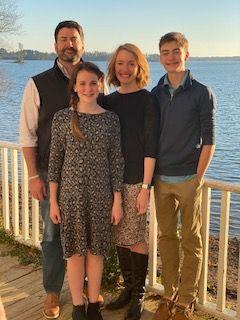
Lamp Unto My Feet, Light Unto My Path
Emily Woodard
Years ago, as a young mother not employed outside of the home, I had the opportunity to audit a few classes at Erskine Theological Seminary. My older brother wanted to audit a class and encouraged me to sit in with him on a lecture. So, I began with Systematic Theology and, while my family ties drew me into the classroom, it was the content that kept me engaged and interested. As my eyes were opened to the Bible in a new way, I grew in my personal and spiritual life and in my understanding of Scripture and Christian doctrine.
During those same years I began to lead a women’s Bible study in my church. The experience of teaching and the work of studying and preparation challenged and stretched me but quickly came to be something I greatly enjoyed. After a few seasons of auditing classes and teaching Bible studies, my family life changed somewhat and, with two children now old enough to attend school, I started to work part-time.
While working in a medical office and later in a law firm, I often wondered what I should do with the rest of my professional life. I contemplated further education in the medical field, but it seemed God wasn’t opening doors in that area. My college education and earlier medical experience combined with the connection I had with a friend had led me to the job in the medical office; the skills I developed there along with another relationship with a friend led me to the job at the law firm. And it was there that I worked with an attorney who was not only an elder at our church but, providentially, was also involved in the search for a new Director of Women’s Ministry. Looking back, it is encouraging to see God preparing the different steps along the path that led me to my current job, working in Women’s Ministry at my church.
Those years of teaching women’s Bible studies and Sunday school classes, along with a deep love for our congregation gave me an excitement about this new adventure in Women’s Ministry. After two years in what I initially called a “dream job,” I still felt excited, but in many ways also in need of more equipping and training. It was this need for equipping and the desire to grow in my ability to serve God and His church faithfully that led me to enroll in a Master’s program at Erskine Seminary.
Lamp Unto My Feet, Light Unto My Path (cont.)
Theological training has been invaluable in providing the skills necessary for me to critically engage with all sorts of ministry situations. Due to my staff position at church I often receive inquiries from members of our congregation about particular books, authors, and/or speakers. So much material is created for and marketed toward evangelical women, and while some of it may have huge success, it is not always doctrinally sound. Seminary has given me more of the Biblical and theological framework needed in order to rightly handle the Word of truth and carefully articulate why I believe something is incorrect or potentially dangerous for someone ’s spiritual life.
Additionally, I have found that as a woman employed by the church I am often asked questions by other women who, for a number of possible reasons, would rather not ask a male minister. I have been approached about a variety of issues from sexuality to parenting and divorce, to the order of the worship service and even phrases used in the creeds. While I would never presume to take the place of our pastors – my answers more often than not include the phrase “you should talk to a minster about this” – my seminary education has prepared me to respond with more confidence and clarity in a number of these situations.
The classes I have taken have not only been intellectually stimulating, and helpful in my ministry context, they have been a blessing to my spiritual life as well. Although I have professional reasons for pursuing a seminary education, I can also say with certainty that this experience would be valuable even if I were not employed by a church in full time ministry. As I have come to know more about God, I have also come to know Him in a deeper and fuller way.
EmilyWoodardistheDirectorofWomen'sMinistryatFirstPresbyterianChurch,Columbia,SC,andthe Women’ sMinistriesSpiritualLifeChairfortheAssociateReformedPresbyterianChurch.Sheiscurrently pursuingaMasterofArtsinTheologicalStudiesatErskineSeminary.SheandherhusbandRobbyhaveasonand adaughter.
ALUMNI SPOTLIGHT
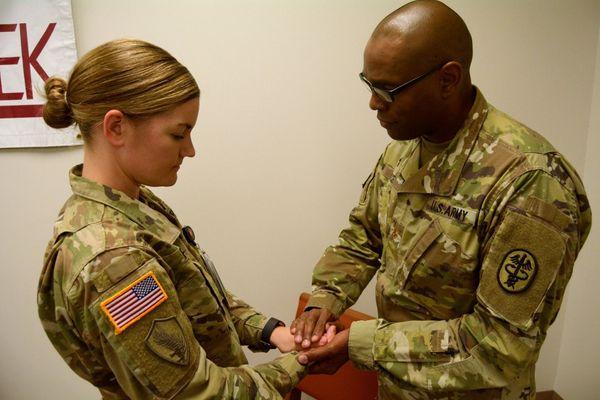
How Will They Hear Without a Preacher?
Chaplain (Major) Britton Price
Ever since he enrolled at the U.S. Army Chaplain Center and School at Fort Jackson, Columbia, SC in 2008, the military has taken Chaplain (Major) Britton Price and his family across the United States and across the globe.
“We started off spending three years in Germany at an Army Garrison in Hohenfels, Bavaria before returning to the States. After I was promoted to Major in 2014 at Fort Bragg, Fayetteville, NC, I served for several years as a hospital chaplain at Fort Sam Houston in San Antonio, TX. Now I am currently stationed at Joint Base LewisMcChord in Tacoma, WA as the Brigade Chaplain for the 2nd Stryker Brigade Combat Team,” said Price.
Changes in geography come with the territory in the life of a chaplain, but it’s not the only type of variety they encounter. While Price is an ordained teaching elder in the Presbyterian Church in America, his ministry context in the Army is quite diverse in comparison to the average local church setting. “Not only do our soldiers come from a variety of socio-economic, cultural, religious and non-religious backgrounds, but as a Brigade Chaplain I oversee seven subordinate chaplains whose views, at times, differ from my own – from Southern Baptist and Lutheran to Methodist and Pentecostal and even a Buddhist,” Price said. “The challenges are there, but so are the opportunities - opportunities to speak the truth and overcome misconceptions about Christianity.”
Contrary to conventional wisdom, Price noted that pluralism in the military doesn’t necessarily create a “vanilla” situation where the Gospel is washed out or forbidden due to fear of offending someone. “In my experience pluralism, odd as it may seem, has actually protected my right to hold to and promote strong Christian distinctives among soldiers and colleagues. For instance, I can still pray in Jesus’ name. Of course disagreements exist, but I’ve found that saying ‘ no ’ when my conscience objects to a situation doesn’t have to be contentious.” He added, “The mission of military chaplains is to protect the free exercise of religion among soldiers. We can all work together to accomplish that even in the midst of our differences.”
One example of faithfully witnessing within such a pluralistic field of ministry stands out. “Once, while I was a medical chaplain in San Antonio, I just so happened to be at the hospital one day when only Protestant clergy were available. A devout Roman Catholic was approaching his final hours, and his family wanted a priest to perform last rites before his death. Again, there were only Protestant chaplains at the hospital at that time, I was the chaplain within reach, and time was of the essence.”
How Will They Hear Without a Preacher?
“I had to explain to them that while I was a Christian chaplain, I was not a Roman Catholic priest. There were many similarities between us yet clear differences in belief and practice. Therefore, I was both unable to perform last rites and unwilling to do so based on my theological commitments. They understood my reasons for this, but still persisted in their search for spiritual comfort and words of blessing,” Price reflected. “So I told them, ‘I cannot perform last rites, but here is what I can do. I can read scripture and pray for your family.”
And he did just that - proclaiming the Gospel through scriptural passages, announcing that Jesus has overcome the grave, and providing hope of the resurrection for that grieving family. “In the end, even though their relative did not receive last rites, this family thanked me for my words and my presence at such a somber time. I could tell that they were encouraged and strengthened that day.” Looking back on that experience Price noted, “More often than not my role as a chaplain is simply being there, being available for people from different backgrounds in all sorts of situations. God provides the circumstances and I faithfully witness to His Word within those circumstances. The plurality of names, faces, and events constantly change, but God’s Truth always remains the same.”
Chaplain(Major)BrittonPriceistheBrigadeChaplainforthe2ndStrykerBrigadeCombatTeamatJointBase Lewis-McChordinTacoma,WAandreceivedhisDoctorofMinistryfromErskineSeminaryin2018.Heandhis wife,Sarah,havefourchildrenandresideinOlympia,WA.
NEWS AT ERSKINE
New Degree Opportunity
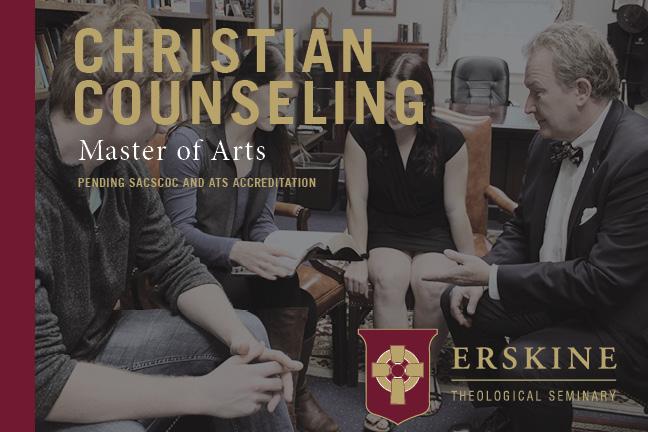
MASTER OF ARTS IN CHRISTIAN COUNSELING (MACC) 60 Hrs
Erskine Theological Seminary is combining the best counseling techniques needed to become a licensed professional counselor (LPC) with a strong, orthodox Christian worldview.
Designed to:
• Prepare students to become applied practitioners to work within social, mental health, and human services agencies while reinforcing a Reformed, Biblical Christian worldview grounded on the grace of the gospel.
• Meet the course work requirements for the Council for Accreditation of Counseling and Related Educational Programs (CACREP), the Licensed Professional Counselor (LPC) of the SC Board of Examiners Licensure, and for the national counselor certification of the National Board of Certified Counselors.
Consists of twin cores:
• Reformed, Biblical Christian worldview and assurance of Scriptural knowledge and integrity (18 Hours)
• Clinical and theological knowledge base that will allow for licensure and employment in a variety of sacred and secular settings (42 Hours)
For information on this exciting degree opportunity, contact Robin Broome at broome@erskine.edu or call 864.379.6571
Faculty News
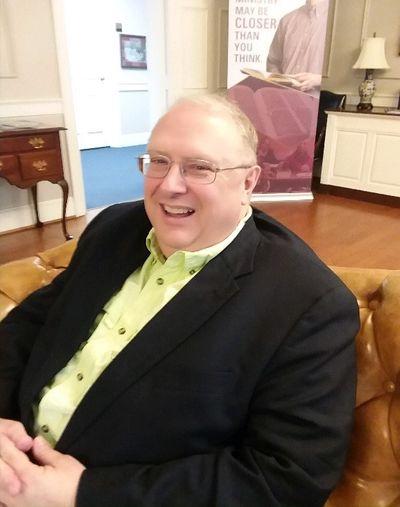
Dr. Duncan Rankin to Become Director of Th.M.
Dr. Duncan Rankin, Distinguished Professor of Systematic Theology, will assume the role of Director of the Th.M. program at Erskine Seminary while continuing to teach at Erskine Seminary's David Livingstone Institute for Christianity, Medicine, and the Sciences. Dr. Rankin brings decades of experience as both a pastor and seminary professor. Additionally, he is a recipient of the John Templeton Foundation Science and Religion Course Prize. He is a graduate of Clemson University (B.S.), Reformed Theological Seminary (M.Div.), and the University of Edinburgh (Ph.D.), with additional studies at Covenant Theological Seminary and the Massachusetts Institute of Technology.
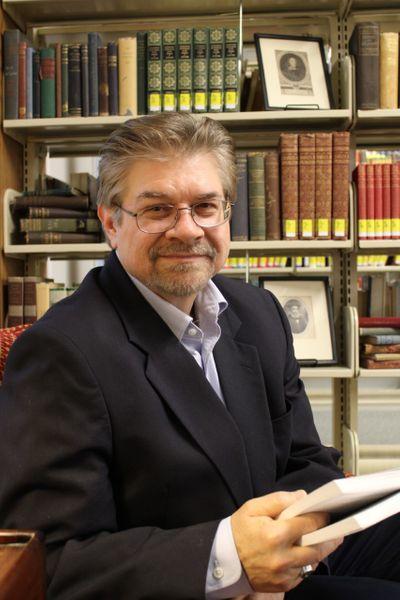
Dr. Daniel Janosik to Teach World Religions
Dr. Daniel Janosik is now Adjunct Professor of Apologetics and Islamic Studies at Erskine Seminary. For over 25 years he has researched and taught on Christian-Muslim relations, the early historical development of Islam, and various topics in Apologetics. Dr. Janosik is a graduate of the College of William and Mary (A.B.), Columbia International University (M.Div., M.A.), and the London School of Theology (Ph.D.) He is the author of the book, Johnof Damascus:FirstApologisttotheMuslims, as well as AGuidetoAnswering Islam.
Faculty Publications
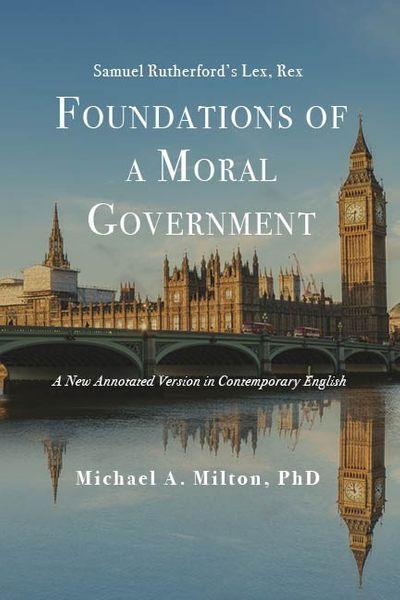
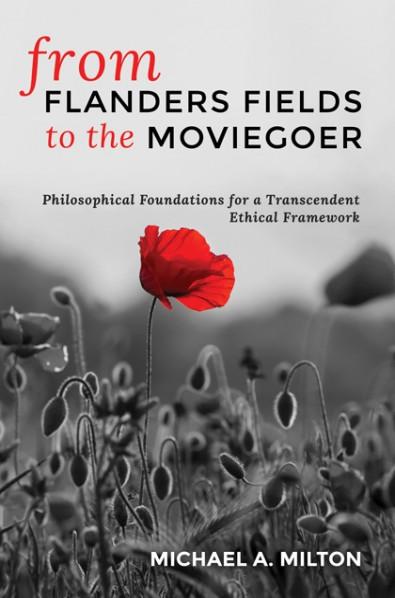
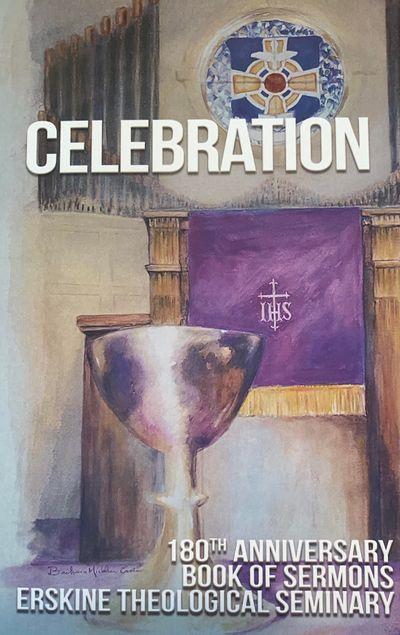
Samuel Rutherford's Lex,Rexhas been largely inaccessible to the modern reader, until now. This newly abridged, annotated, Standard English edition communicates his ideas in a fresh, informed, and relevant way for a contemporary audience. In Foundationsof MoralGovernment, Dr. Michael A. Milton carefully elucidates principles that were both foundational to the establishment of government in the United States and influential to the constitutional monarchy in Great Britain.
How do educators, clergy, attorneys, and the concerned public come to terms with meaningful, workable ethics in an age that eschews any attempt to define truth and error?
Dr. Michael A. Milton has addressed this question in the new monograph, FromFlanders FieldtotheMoviegoer:PhilosophicalFoundationsforaTranscendentEthicalFramework. Milton draws on English literature, sociology, history, public policy, and theology to mark milestones in the cultural journey from the philosophical crisis after World War I, the end of modernity and the introduction of the “theater of the absurd” in post-modernity. Rather than merely a survey, this monograph proposes a “way forward” in teaching metaphysical ethics.
This collection of sermons by the faculty of Erskine Theological Seminary is an offering and doxology unto the Lord. It is both our Celebrationof 180 years of God's providence, and our prayer for the next 180 years that we may be found faithful to the Lord's calling. Each of the sermons in this volume addresses some aspect of God's providence.
David Livingstone Institute for Christianity, Medicine, and the Sciences
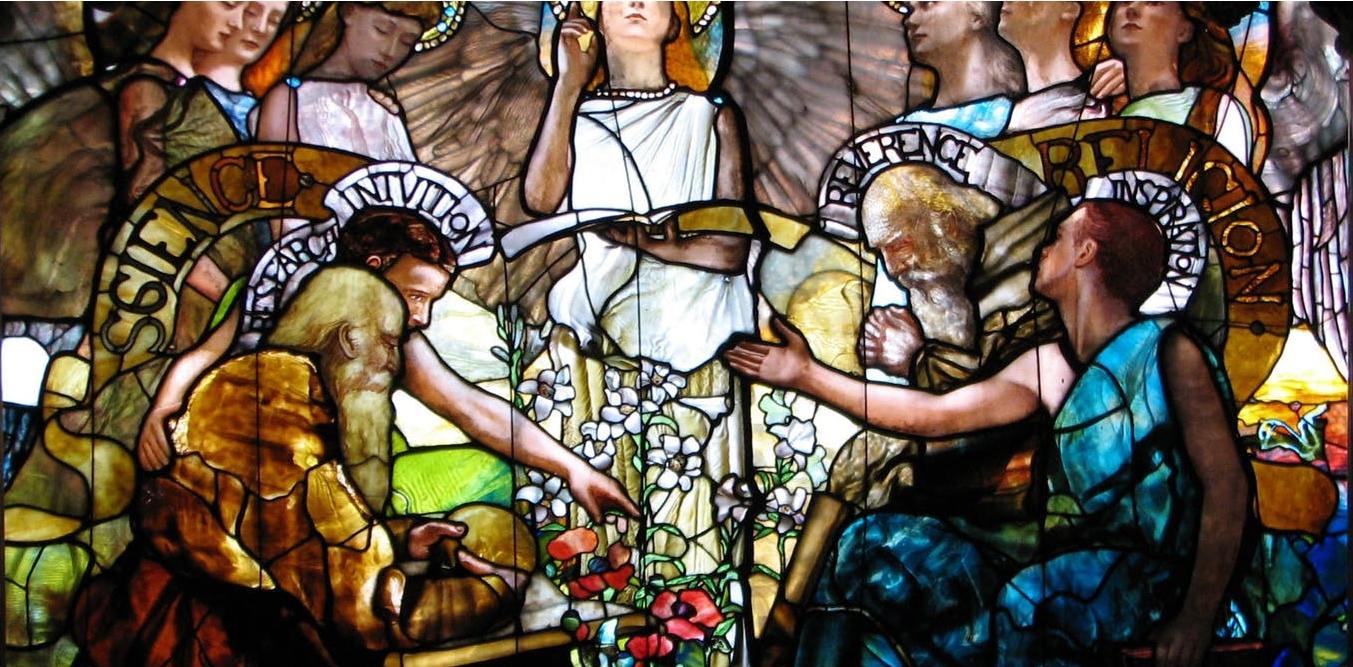

Did you know that Erskine Seminary and the David Livingstone Institute for Christianity, Medicine, and the Sciences offer graduate Certificate Programs in Christian Worldview, Apologetics, and Biomedical Ethics in both online and live classroom formats? Our courses are designed for practicing medical and scientific professionals and students in training in these areas. Graduate credits earned in certificate programs are transferable to a Master of Arts in Theological Studies (MATS) degree at Erskine Theological Seminary.
Clinical Pastoral Education (CPE)
Did you know that Erskine Seminary partners with the Institute of Clinical Pastoral Training to offer Clinical Pastoral Education (CPE) training to chaplains and spiritual care providers? Two units of Clinical Pastoral Education are included in our curriculum. Erskine Seminary has been preparing chaplains for ministry for over 20 years.
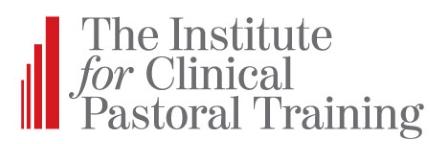
The Institute for Clinical Pastoral Training is accredited by the Accrediting Council for Continuing Education Training (ACCET). ACCET is listed by the U.S. Department of Education as a nationally recognized accrediting agency.
For information on these two programs contact, Robin Broome at broome@erskine.edu
Alumni in Action
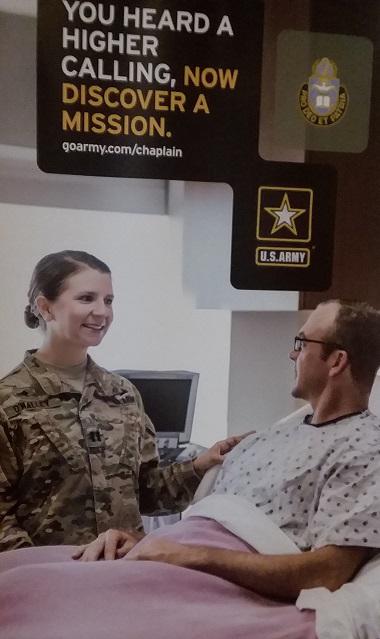
Chaplain (Captain) Mary E. "Mel" O'Malley (D.Min. 2016) serves as an Army chaplain at Arlington National Cemetery in Arlington, VA. Before her current assignment, she was chaplain for the Warrior Transition Battalion in Fort Carson, CO., hospital chaplain at Brooke Army Medical Center, San Antonio, TX, and was deployed for one year as a chaplain at the largest detention facility in Afghanistan. She is married to Major Greg O’Malley, and they have one son.

Trevor Allen (M.Div. 2019) serves as a Church Planting Apprentice in Ventura, CA. He, his wife Noelle, and their two children are embarking on a 24-month church planting apprenticeship. They are currently vision building and gathering a core group under the supervision of the session at Christ Church Ventura (PCA). Trevor previously served as Director of Youth Ministries at Chapin Presbyterian Church (PCA) in Chapin, SC.
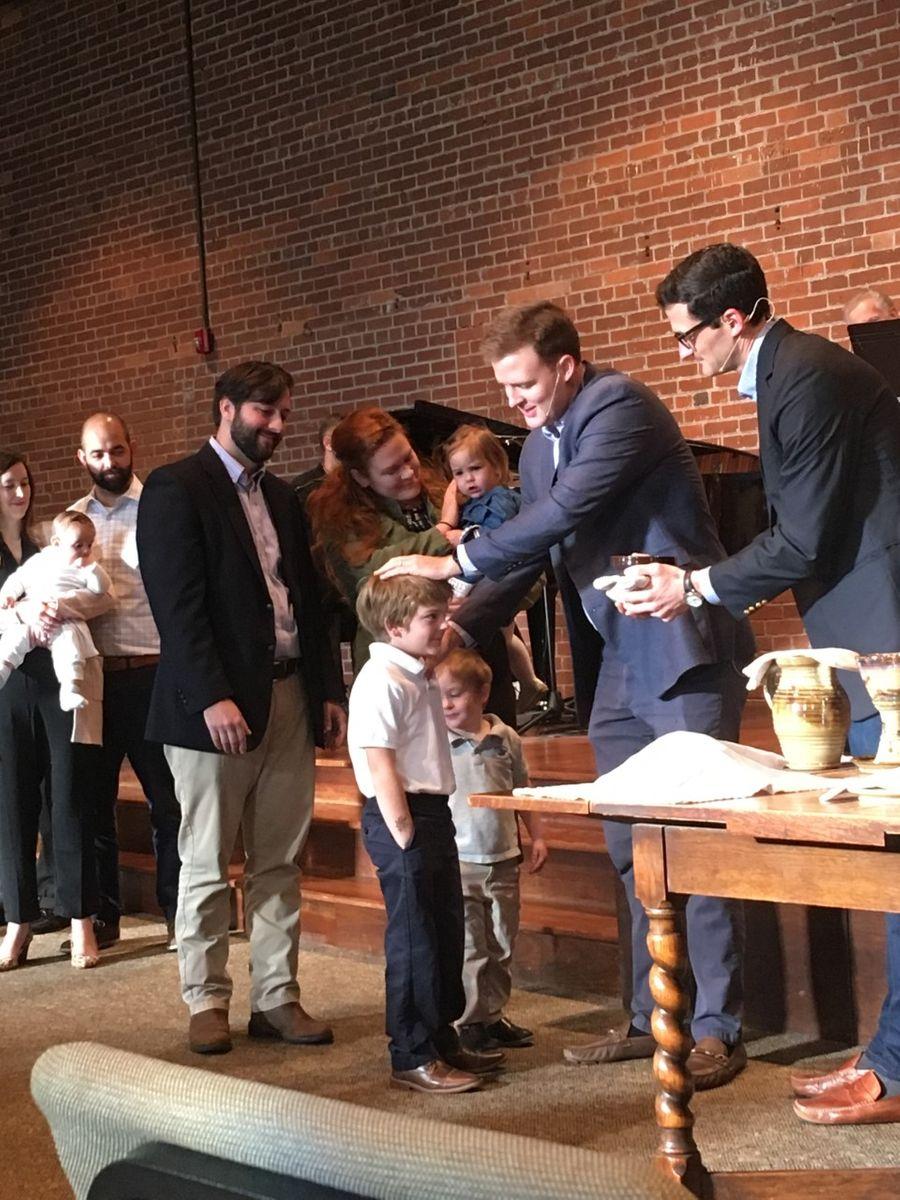
Rev. Chandler Machemehl (MDiv, 2018) serves as Youth Pastor at Downtown Presbyterian Church (PCA) in Greenville, SC. He previously served in youth ministry at First Presbyterian Church (PCA) in Augusta, GA. He and his wife, Allison, have a daughter. In the picture Rev. Machemehl is baptizing Lucas, Nicolas, and Leona Brown, children of current Erskine Seminary M.Div. student, Jay Brown (wife Hanna).
Upcoming Events
Finishing The Race
Rev. Bryan Bult
Assoc. Minister to Seniors, First Presbyterian Church, Columbia SC
Monday January 27, 2020
11:45 - 1:00 pm
Lunch included, Please RSVP to Crystal Tolbert
tolbert@erskine.edu
Cosmic Reasons to Believe
Dr. Hugh Ross
Erskine Theological Seminary Columbia Campus
1400 Lady St. Columbia, SC
The Bridge, Room 125
President and Founder, Reasons to Believe
Monday February 3, 2020
7:00 - 8:30 pm
RSVP HERE
Soul Food Extravaganza
Jennifer Pinckney
Monday February 24, 2020
5:00 - 6:30 pm
Please RSVP to Crystal Tolbert
tolbert@erskine.edu
First Presbyterian Church
200 W. Washington St. Greenville, SC 29601
Fellowship Hall
Erskine Theological Seminary Columbia Campus
1400 Lady St. Columbia, SC
The Bridge, Room 125
